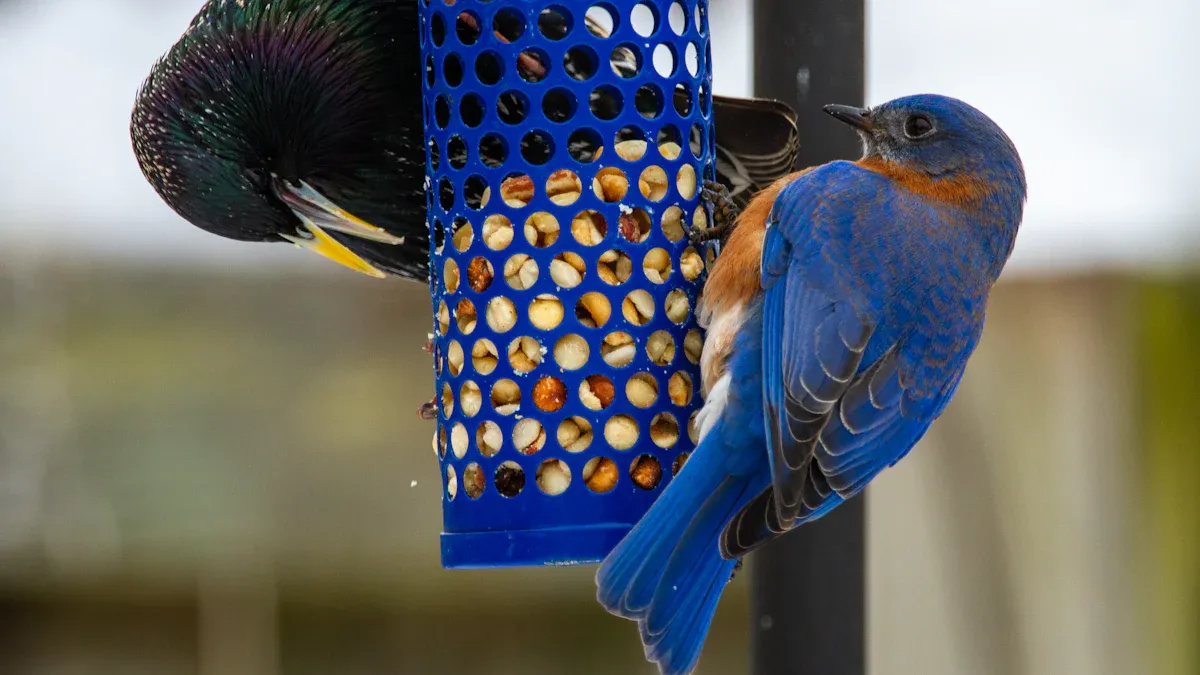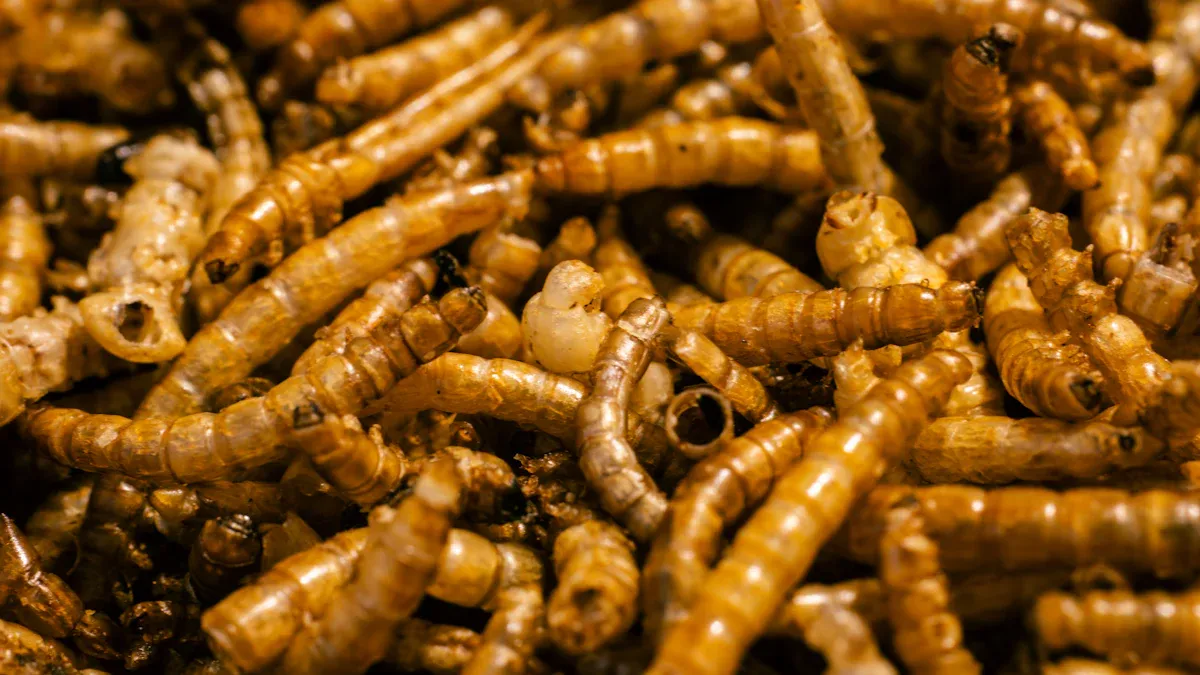
Buying mealworms dried bulk can be a smart choice, but purchasing the wrong quantity often leads to waste and extra costs. With the mealworms market expected to grow to $1.27 billion by 2030, it’s clear that demand is rising. Choosing the right amount ensures freshness, saves money, and reduces unnecessary waste.
Key Takeaways
- Think about why you need mealworms before buying them. Decide if they are for chickens, birds, or reptiles to get the right amount.
- Figure out how much your animals eat. Watch their eating habits to avoid buying too much and keep them fresh.
- Keep mealworms in a cool, dry spot in sealed containers. Good storage helps them last longer and stay healthy.
Assess Your Usage Needs
Determine Your Feeding Purpose
Before buying mealworms dried bulk, it’s essential to know why they’re needed. Are they for feeding backyard chickens, wild birds, or reptiles? Each purpose may require a different quantity or frequency of feeding. For example, small-scale farmers in South Africa have successfully used mealworms as poultry feed. This approach reduces reliance on traditional protein sources like soybean and fishmeal. Similarly, studies show that insects in animal feed can lower dependency on conventional options, making mealworms a sustainable choice.
Mealworms are packed with nutrients, making them a versatile feed option. They contain 23.7g of protein per 100g, which is higher than many other insects like waxworms or silkworms. Their high levels of calcium, iron, and B12 also make them ideal for promoting animal health.
Calculate Consumption Rates
Understanding how much feed is needed helps avoid overbuying. Start by estimating how many animals will consume the mealworms and how often they’ll be fed. For instance, a flock of ten chickens might eat about 1-2 pounds of mealworms weekly. Adjust the quantity based on the size and dietary needs of the animals.
Tracking consumption over a few weeks can also help refine estimates. This ensures the right balance between having enough stock and avoiding waste. By calculating rates accurately, buyers can make informed decisions and maximize the value of their purchase.
Consider Storage and Shelf Life
Ideal Storage Conditions
Storing mealworms properly is key to maintaining their quality and nutritional value. A cool, dry place works best to prevent mold growth and keep mites away. Excess moisture can attract pests, which harm the mealworms and reduce their shelf life.
To ensure the best results, follow these tips:
- Use airtight containers to keep moisture out.
- Store them in a dark area to avoid light exposure.
- Check for contamination regularly.
A study on storage practices highlights the importance of drying techniques. Proper drying not only extends shelf life but also preserves the nutritional properties of mealworms. Here’s a quick overview:
| Aspect | Findings |
|---|---|
| Drying Techniques | Essential for extending shelf life. |
| Food Safety | Reduces microbiological and chemical risks. |
| Nutritional Properties | Maintains quality and consumer acceptability. |
Understanding Shelf Life
Mealworms dried bulk can last anywhere from 3 to 12 months, depending on storage conditions. Keeping them in a cool, dry environment prevents mold and mites, which can shorten their lifespan.
Interestingly, mealworm larvae can transform into adults in just two weeks under optimal conditions. This rapid development shows how important it is to control their environment. Regular inspections and proactive pest control help ensure the mealworms stay fresh and usable for longer periods.
By following these guidelines, buyers can maximize the shelf life of their mealworms and get the most value out of their purchase.
Balance Cost and Value

Benefits of Buying in Bulk
Buying mealworms dried bulk offers several advantages. Bulk purchases often come with discounts, making them more cost-effective than smaller packages. This is especially helpful for those feeding a large number of animals, like backyard chicken owners or reptile enthusiasts. By purchasing in bulk, they can save money while ensuring a steady supply of nutritious feed.
Another benefit is convenience. With a larger stock, there’s no need for frequent trips to the store or repeated online orders. This saves time and effort, allowing buyers to focus on other tasks. Additionally, bulk buying reduces packaging waste, making it an eco-friendly choice. For those who prioritize sustainability, this is a win-win situation.
Avoiding Overbuying
While buying in bulk has its perks, overbuying can lead to waste. To avoid this, buyers should first assess their storage capacity. Mealworms need a cool, dry place to stay fresh. Airtight containers help keep moisture out, while proper ventilation prevents mold and mites. Labeling containers with purchase dates and types of mealworms makes it easier to track freshness.
Monitoring consumption rates is another effective strategy. Feeding schedules should match the animals’ needs without overfeeding. Regularly checking for contamination ensures the mealworms remain safe to use. By following these practices, buyers can strike the right balance between cost savings and minimizing waste.
💡 Tip: Start with smaller bulk purchases to test storage and consumption rates before committing to larger quantities.
Buying mealworms dried bulk doesn’t have to be complicated. By assessing usage needs, considering storage and shelf life, and balancing cost with value, buyers can make informed decisions. It’s all about understanding specific requirements and planning ahead. With these tips, anyone can enjoy the benefits of mealworms without waste or overspending.
FAQ
How do I know if my mealworms have gone bad?
Check for mold, a foul smell, or pests in the container. If you notice any of these, discard the mealworms immediately.
Can I freeze dried mealworms for longer storage?
Yes! Freezing dried mealworms extends their shelf life. Use airtight bags or containers to prevent moisture and freezer burn.
Are mealworms safe for all animals?
Mealworms are safe for most birds, reptiles, and small mammals. However, always check your pet’s dietary needs before adding them to their diet.
🐛 Pro Tip: Introduce mealworms gradually to ensure your animals adjust well to the new feed.


